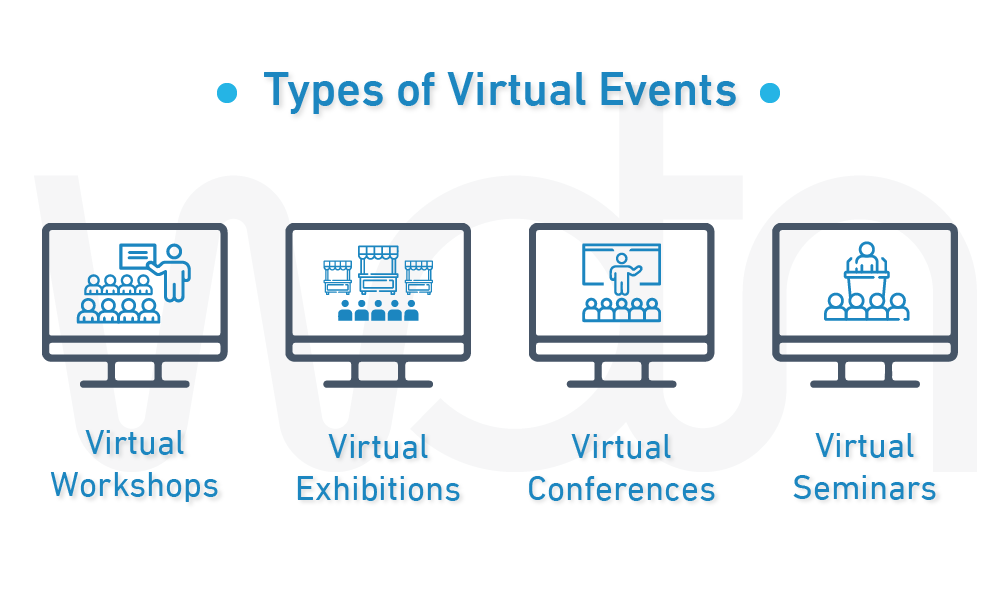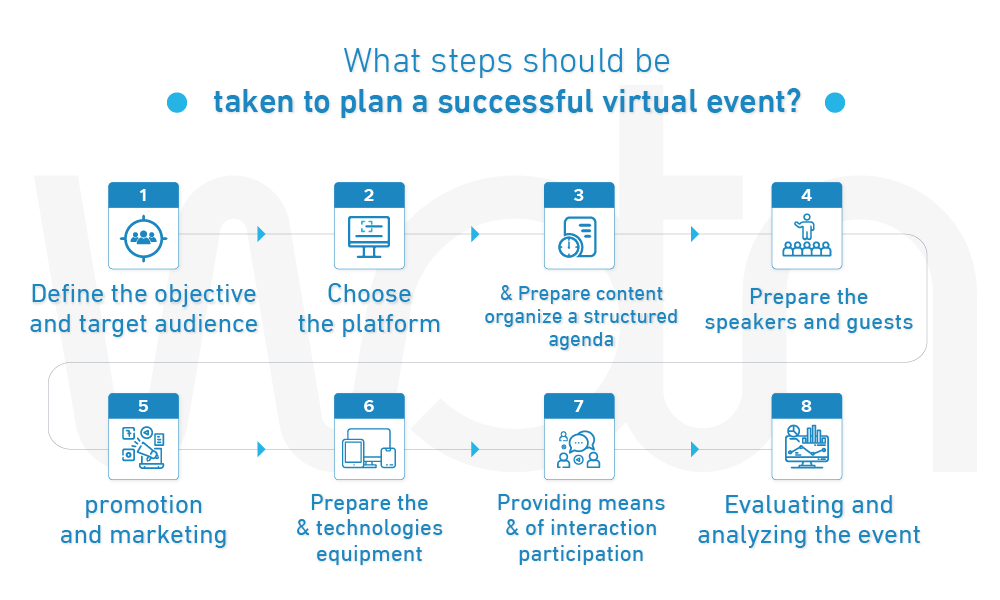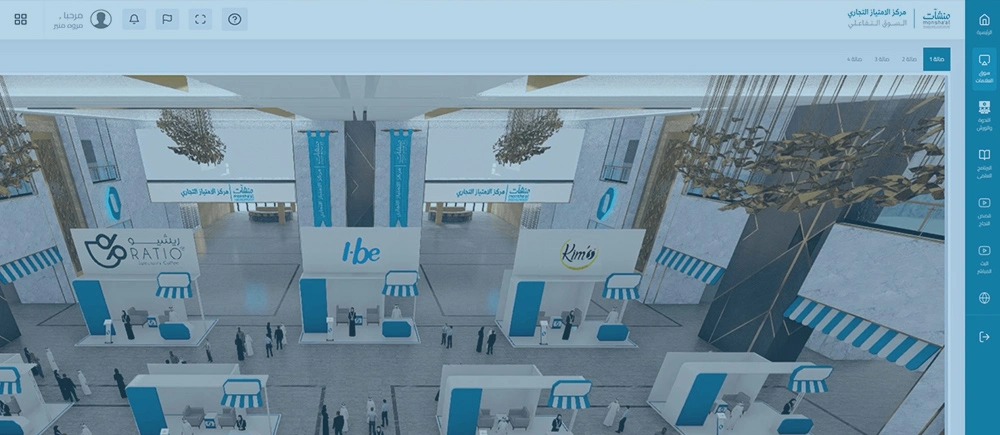Your Vision, Delivered
Say hello to the real experience!
Bring your next event to life—guided by experience, innovation, and excellence.
Let’s create together
As the proverb goes, "From every harm, there is a benefit" We often discover new solutions and opportunities behind adversities that can reshape our future positively. For example, when the global COVID-19 pandemic arose, many organizers and participants opted for virtual events as an alternative and easily achievable solution to traditional events that require travel and physical presence. With this alternative gaining popularity, individuals now have a tremendous opportunity to securely and effectively exchange ideas and experiences.
Even as the world gradually returns to normal, virtual events have maintained their importance. This is the perfect time to delve into this exciting realm. Whether you are an organizer seeking to make a positive impact in your field or a participant looking to expand your knowledge and explore new opportunities, this article will provide an in-depth look at the various types and importance of these events. Additionally, we will offer valuable insights and strategies for successful planning and execution.
Refer to gatherings that take place online instead of in-person meetings. These events are characterized by their presence on internet platforms and technologies, aiming to facilitate communication among participants, deliver exceptional content, and foster interaction. Organized for a variety of purposes, including education, marketing, recruitment, entertainment, networking, and influence, can be free or require payment, depending on their nature and scope.
These events have become a flexible and effective option for communication. They offer participants the opportunity to attend a wide range of events without being limited by distance or time constraints. By providing an interactive and engaging experience, they allow for communication and learning. Regardless of the purpose, they serve as an innovative and efficient means of exchanging knowledge and fostering interaction in our advanced digital world.
These come in various forms and can be classified based on their nature, scope, and objectives. Here are some examples:

Virtual seminars are designed to transfer knowledge and expertise in specific fields through the use of technology. These events typically feature keynote speakers who deliver insightful presentations on various concepts and recent developments in their respective domains. Participants have the opportunity to ask questions, seek clarification, and engage in discussion sessions to exchange opinions and ideas.
Virtual conferences are among the most significant events in the world of gatherings, as they bring together a group of experts and professionals to exchange knowledge, experiences, and discuss the latest developments in their fields. These events typically feature scientific sessions, workshops, and interactive discussions that aim to enhance collaboration and build strong professional relationships.
Virtual exhibitions provide an innovative virtual environment for showcasing products and services in various fields. Visitors can discover innovations through interactive interfaces and presentations. Additionally, virtual exhibitions offer opportunities for companies and organizations to enhance their market presence and increase public awareness of their products and services.
Virtual workshops are held to provide practical training and education in various fields. These workshops offer participants the opportunity to acquire new skills and enhance their capabilities in areas such as programming, digital marketing, project management, and more. Virtual workshops enable interactive learning experiences through live demonstrations, hands-on exercises, group collaborations, and discussions facilitated through online platforms.
Whether you attend virtual seminars, conferences, or exhibitions, you will find yourself immersed in a dynamic community full of opportunities. These events offer a unique chance to connect with people from various backgrounds and cultures, enriching your experience and broadening your horizons in the process.
There are numerous benefits that can be gained from hosting an online gathering, including:
One significant benefit is the reduction in costs associated with physical venues, equipment, transportation, accommodation, and catering. By eliminating these expenses, online gatherings can help businesses and organizations increase their return on investment and maximize their resources. Furthermore, they save valuable time for both hosts and participants, as there is no need for travel, waiting in queues, or dealing with logistical issues.
Online gatherings offer several advantages, including the ability to attract a larger and more diverse audience from different countries, cultures, and backgrounds. This creates more opportunities for learning, exchange, and impact, as participants can share their knowledge, insights, and experiences with a broader range of people. Additionally, they provide various features such as chat, voting, screen sharing, games, and prizes that enable hosts to interact and engage with participants. This enhances communication and helps build new relationships with individuals who share common interests from around the world.
One of the key benefits of hosting an online gathering is the freedom it provides in designing and executing the event in a creative and unique manner. The host has the flexibility to choose the platform, program, content, schedule, event partners, and sponsors based on their objectives and audience, allowing for a truly customized experience. Moreover, they offer the opportunity to utilize cutting-edge technologies such as virtual reality or augmented reality to create immersive and engaging experiences for attendees.
Yes, indeed. According to a study conducted by Grand View Research, the global virtual events market was estimated to be around $114 billion in 2021, and experts expect it to reach approximately $366 billion by 2027. This significant growth indicates the promising future of these events as they meet the aspirations and needs of the modern era. Here are some reasons that support this perspective:
The world is experiencing rapid technological advancements, and this is having a significant impact on these gatherings such as conferences, exhibitions, and workshops. Modern technology enables advanced interaction and realistic experiences for participants. Cutting-edge tools such as virtual reality and augmented reality can be utilized to create interactive environments and experiences that closely resemble those in the physical world. Furthermore, advanced technologies provide interactive tools such as voice and video chat and real-time interactions, which enhance communication and active participation among participants effectively.
There is a growing trend towards online gatherings due to the flexibility and convenience they offer. Participants can engage easily without the need for travel or extra planning, making it easier for people to attend. Furthermore, virtual events provide a unique opportunity for participants to gain global experiences and connect with individuals from different parts of the world.
Online gatherings also play an important role in promoting social and environmental responsibility. They reduce the negative environmental impacts of traditional events, such as carbon emissions and waste, by eliminating the need for physical transportation and infrastructure. Moreover, virtual events promote inclusivity and equality by enabling communities and marginalized or underserved groups to easily participate in events. Given the various advantages and benefits of virtual gatherings, it is likely that they will continue to evolve and expand in the near and distant future.
When hosting a successful virtual event, whether it's a virtual conference, exhibition, or workshop, it requires careful thinking and planning to ensure a well-organized event that meets the audience's needs and achieves the desired goals. Here are some key steps to follow for exceptional success:

To plan a successful virtual event, it is crucial to begin by establishing clear and SMART objectives and defining your target audience. This involves identifying the specific goals you want to achieve and determining the audience you want to reach with your event. By doing so, you can better understand the needs and interests of your audience and design an event that meets their expectations and provides value.
Once you have identified your objectives and target audience, the next step in planning a successful virtual event is choosing an appropriate platform. It is essential to select a user-friendly platform that effectively meets the needs of your intended audience. Additionally, the platform should offer features that facilitate effective communication and allow for easy organization of polls or surveys. It is also crucial to choose software that can help organize content and event schedules in a clear and well-coordinated manner.
Keeping attendees engaged is critical to the success of these events, as it helps to maintain their interest and attention. To achieve this, it is important to carefully prepare impactful presentations, effective workshops, and stimulating discussion sessions, as well as organize interactive activities that encourage attendee participation. It is also essential to distribute the content evenly and balance it throughout the event, incorporating regular breaks to allow participants to recharge and refocus. By doing so, you can ensure that attendees remain engaged and actively involved throughout the event, maximizing the impact and effectiveness of your gathering.
Choosing the right speakers is crucial to its success. It is important to select individuals who have expertise and a good reputation in the relevant field, and to provide them with the necessary guidance and information to ensure their success. As the event organizer, you should also coordinate the sessions and schedule guest participation in alignment with the event agenda, ensuring that each speaker has adequate time and resources to deliver their presentation effectively.
Effective promotion is key to the success of any virtual event, and it is essential to use appropriate marketing strategies to reach the right audience. This can be achieved through a range of tactics, including leveraging social media platforms, email marketing, and targeted advertisements, to promote the event and attract the intended audience.
This step is one of the most important steps, so It is essential to ensure that all required devices, such as cameras, microphones, and sound systems, are prepared and set up properly. Additionally, it is crucial to guarantee the quality and stability of the internet connection to provide a seamless experience for the participants. To ensure the safety and proper functioning of the equipment, it is important to conduct tests and trials beforehand.
This step is crucial for the success of a virtual event: ensuring active participation by providing interactive tools that enable attendees to engage with each other and the content. These tools can include chat functions for asking questions and participating in discussions, as well as conducting opinion polls and surveys to gather feedback. By encouraging attendees to speak up and participate, the overall experience for everyone involved can be greatly improved.
the event After the event concludes, it is important to conduct a post-event evaluation and analysis to determine its overall success. This process involves assessing whether the event objectives were met, evaluating the level of feedback and audience engagement, and gathering observations and comments from participants. Measuring key performance indicators is also crucial to identify areas of strength and areas that require improvement for future events.
By implementing these creative steps, you can plan and organize your event with exceptional efficiency and effectiveness. This will enable you to deliver your message in a captivating and engaging manner, inspiring and capturing the attention of your audience just as you intended.

There are many platforms available that can effectively organize virtual events. However, one platform that distinguishes itself is "WOTN." As a leading company in this field, we offer comprehensive technology solutions that enable the creation of immersive virtual spaces that closely resemble reality. With these spaces, the audience can interact with the content and speakers exceptionally, resulting in an engaging and memorable experience. Furthermore, we furnish valuable data and statistics about the event's performance, facilitating analysis and enhancement.
We also provide high-quality media production services, effective marketing, and outstanding public relations, ensuring each aspect of the event is meticulously planned and executed to achieve the desired outcomes. Thanks to our experience and efficiency, we have successfully organized many virtual conferences and exhibitions.
Through these events, we have earned the trust of our clients and the satisfaction of the audience. Therefore, we are always ready to organize any event through a qualified and inspiring team that works in an innovative and professional manner. Our team has a visionary and ambitious approach that ensures the achievement of your goals in the best way. Don't hesitate to contact us now to organize and manage your upcoming event.
Read More: From Chaos to Order: The Art of Crowd Management at Events
Say hello to the real experience!
Bring your next event to life—guided by experience, innovation, and excellence.
Let’s create together
